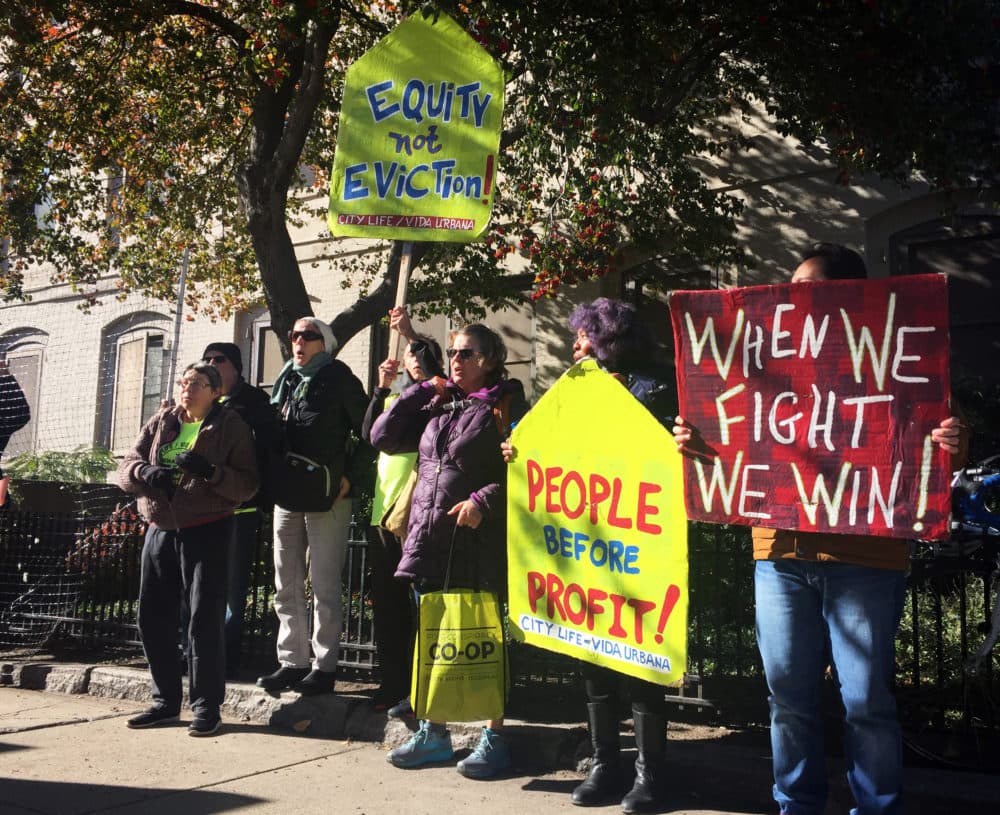Advertisement
Concern Over Displacement Grows As Artists Are Evicted From Piano Craft Guild Studios

On Friday afternoon, the Boston Area Brigade of Activist Musicians struck up a tune as protesters marched in front of the Piano Craft Guild building in the South End, carrying a huge banner emblazoned with the words “Eviction Free Zone.”
Activists were protesting the eviction of several artists from the building’s commercial studio space. They said it is the most recent move by management to displace a decades-old creative community.
A petition, which activists said had garnered over 500 signatures, was delivered to the building's management, The Shoreline Corporation. The petition asked for "a proper negotiation towards a fair deal with the remaining visual artists at the Piano Craft Guild." During the demonstration, a representative from the housing activist group City Life/Vida Urbana read a letter of support from the city of Boston. Representatives from the staffs of Boston City Council members Ayanna Pressley and Michelle Wu were also in attendance.
Artists renting work space in the building’s commercial wing were notified last November that their leases would not be renewed when they expire in January of 2019. Three artists — Wayne Strattman, Ekua Holmes and Peter Lipsitt — still make use of studios there. A fourth artist, Paul Goodnight, who is also a resident of the building, was able to secure alternative on-site studio space and reimbursement for relocation costs.
The Piano Craft Guild building at 791 Tremont St. has been a home to artists since the ‘70s, when Simeon Bruner bought the former piano factory with the help of a Massachusetts Housing Finance Agency affordable housing loan. The block-long building was converted into over 100 affordable live-work spaces for artists and became a vital creative hub in the city. Tenants organized against the building’s ownership on two different occasions in the ‘90s to protest rent increases. Artist presence has dwindled over the years, though some artist live-work spaces remain and the affiliated Piano Craft Gallery continues to operate.
Strattman, who has rented space in the building for 35 years, said that the protest was intended to pressure The Shoreline Corporation to negotiate with the remaining artists. He said that since July management has refused to speak to him directly and has instead communicated through lawyers. He hoped that the corporation would assist the artists with relocation costs, estimating that he personally would spend $60,000 to relocate his studio.
“What they're talking about replacing us with is more luxury apartments,” Strattman said. “And I think we've got enough of those in the South End.”
Karen Schwartzman, a spokesperson for the Piano Craft Guild, confirmed that the studio space would be converted into residential apartments. But she took issue with the artists’ complaints, pointing out that they had been given more than a year’s notice and that the owners of the building were well within their legal rights not to renew the leases.
“It’s understandable that these affected commercial tenants would want to stay in the building because as commercial tenants they’ve had access to all the amenities available to our residential tenants,” Schwartzman said. “For example, the pool, the fitness center, the Piano Craft Gallery, parking and the bike room, the courtyard and grill, delivery services — all of those things at no additional cost.”
On its website the Piano Craft Guild advertises “stylish loft apartments” and “a lively artist neighborhood at your doorstep.”
The dispute comes in a moment of crisis for the artistic community in the Boston area as rents rise and work space becomes more scarce. In the winter, more than a dozen artists were evicted from studios at 128 Brookside Ave. in Jamaica Plain. In the spring, approximately 200 musicians and artists lost the use of affordable practice and studio space at the EMF building in Cambridge's Central Square. And in the summer, Northeastern University informed artists in the African American Master Artists in Residence Program that they would no longer have use of the studio space at 76 Atherton St. in Jamaica Plain that the group has occupied, free of charge, since the 1990s. The future of the 40-year-old black artist collective remains uncertain as the two parties continue closed-door negotiations mediated by the city.
Helen Matthews, communications manager of City Life/Vida Urbana, said the organization got involved in the Piano Craft Guild dispute out of concern for the increasing financial difficulty artists face in Boston.
“We've been really shocked and alarmed by this wave of artist evictions,” Matthews said. “The city needs to step up and take a holistic interventionist approach into this so that our city doesn't just hemorrhage artists away in this wave of gentrification.”
